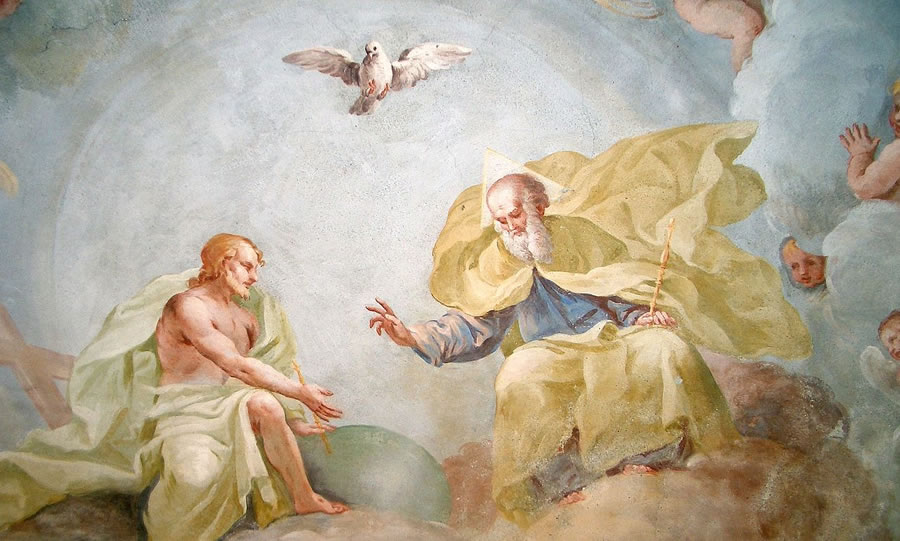
Holy Trinity Sunday
by Deacon Bill Schneider | 06/01/2023 | Images of FaithToday, Catholic Christians celebrate the feast of the Most Holy Trinity. On this day, we remember the basic dogma of our faith—the Trinity. This dogma holds that, though we believe in only One God, this God has Three Divine Persons: Father, Son, and Holy Spirit.
We read in St. Paul’s second letter to the Corinthians about the necessity to love one another. He says, “Mend your ways, encourage one another, agree with one another, live in peace, and the God of love and peace will be with you. Greet one another with a holy kiss” (2 Corinthians 13: 11-12). Through the centuries, members of the Church have never agreed completely on everything.
Nevertheless, the Church has always taught that we must all treat each other with respect based on the dignity everyone deserves as a human being. In our liturgy, we even have a ritual called “the Sign of Peace” that symbolizes this fundamental respect we should have towards others. Because we do this at every Mass, we sometimes take it for granted. We may even forget the power of this ritual until someone from the outside points it out for us. That is exactly what we see in the following story.
There was once a priest from a great cathedral in New York City who went halfway around the world to Japan. There, he met many people who knew almost nothing about Christians or how they worshiped God. So, one day, the people asked the priest to show them a Christian worship service. The priest said, “I would be happy to do that. But first, would you first show me how you worship in the Shinto religion here in Japan?” The Shinto religion, in case you don’t know, is an indigenous religion of Japan and several centuries older than Christianity.
The people said they would be happy to show the priest the Shinto tea ceremony. In the ritual, everyone sat very quietly for a long time. Then, someone brought out a beautiful bowl and prepared some special tea. Then, everyone drank a little of the tea from the special bowl. Then, the priest showed them a Christian worship service—the Eucharist or Mass. The Communion part of the Eucharist or Mass was somewhat like the sharing of the tea in the Shinto ceremony, so that was no big surprise. They were surprised, however, that instead of being quiet, the people prayed out loud and sang songs to God.
But the thing that totally surprised the Shinto people was “the Sign of Peace.” Shaking hands and hugging, sometimes kissing, while worshiping God were absolutely amazing to them. They were not only shocked by this practice, but they also found that they liked it.
A Shinto woman came up to the priest after the Mass, picked up one of the very special tea bowls used in their tea ceremony and said, “I want you to take this back to New York to your cathedral. From now on, we will call it Kiss of Peace.”
This inspirational story may make us look at what we do in the Mass, especially when we do the Sign of Peace. But calls for peace and love and respect also lead us to look at the totality of our faith.
Here are three things we should consider when looking at issues such as harmony with others in the Church:
First, we will not always agree with one another on everything, and indeed we should not. As Catholic Christians, we believe that our consciences must always be our ultimate guide in determining “right” from “wrong” for us. Some in the Church today, for example, believe strongly that all people should have certain fundamental civil rights. Others disagree. Some believe that we should welcome strangers as Jesus commanded us to do, while others do not believe in welcoming them.
Second, as Catholic Christians, we should agree on dogma. Dogmas are the doctrines of the Church that are unchangeable. Examples of dogmas would be the idea that there is only One God, but Three Divine Persons in this God. Examples of dogmas would be that Jesus is the Savior and died for us and rose from the dead. When we say the Nicene Creed after the homily on Sundays, for example, we affirm the basic dogmas of our Faith.
Third, we are called to love one another as Jesus commanded us to do in the triple-love command he gave us. To love others means we treat them with respect. Jesus gives us specific ways we are to show love towards others such as giving drink to the thirsty and food to the hungry, and clothes to the naked. We are to instruct the ignorant, console those in sorrow, welcome the stranger, and bury the dead. In other words, we are to treat others as we would like to be treated, and we are to treat them well because all people are children of God.
As we continue our life’s journey this week, it would be a very good idea to reflect on how we show respect to others, especially to those with whom we disagree on various issues.
In Christ,
Deacon Bill
BACK TO LIST BACK